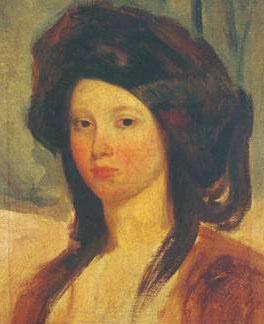Famous as Victor Hugo’s mistress, most people know little about the woman who devoted the greater part of her life to the famous author.
Born Julienne Joséphine Gauvain in Fougères, France on 10 April 1806, the woman we now know as Juliette Drouet was orphaned by the age of two and subsequently raised her uncle, a retired ex-military man, loving but unsuited for parenthood. From the outset, Juliette’s charm and independence trumped her uncle’s childrearing skills and consequently her childhood was devoid of discipline and filled with a mixture of innocent delights and freedoms. It was a childhood she remembered fondly throughout her life.
When Juliette turned 10, her uncle decided a more structured regime might suit his independent niece and that a convent, alongside her two aunts, was the right atmosphere for Juliette to become a distinguished pupil, pious novice, and eventually, a holy nun. In fact, she only achieved the first of her uncle’s dreams. Throughout her convent life, Julienne consistently broke the rules but her charm, and the fact that two of the sisters were her aunts, gained her a leniency rarely experienced within the cloister. That is not to say that she did not suffer deprivations. In later life, she described the convent’s sombre atmosphere, padlocked gates, dark and damp corridors, interminable prayers, and imposed austerities as a none too cheerful part of her life. Despite the hardships and restrictions, the convent did not break Julienne’s spirts. She learned to sing and to sketch and paint in water-colours and perhaps more importantly, she learned tact and restraint and an air of distinction that served her well in the drawing rooms of her later life.
At the age of 16, Julienne was presented to the Archbishop of Paris as a postulant. At that meeting, she convinced the Archbishop that her desire for the world made her an unsuitable candidate for life in the church. That very evening, with his blessing, Julienne left the convent.
In 1825, at the age of 19, Juliette’s taste for independence, fiery temper, and impulsive nature found her amongst the painters and poets, models, actresses, dames of high degree, politicians and other members of high society at the Rue de l’Abbaye, studio and drawing room of the flamboyant and vain sculptor, James Pradier. Dressed outrageously in high boots, purple velvet jacket and matching trousers with his gigantic Scotch greyhound by his side, Pradier received his guests into his studio and, as they conversed, he impressed them with his sculpting skill. Drawn in by the charm of this artist and grand viveur, Juliette offered to model for Pradier. The combination of her youth, beauty, and willingness proved irresistible the sculptor and soon she was ensconced not only as model but lover. Within a year, Juliette gave birth to Pradier’s child, a girl they named Claire Pradier.
James Pradier may not have achieved the success he would have hoped and could not afford the lifestyle he desired but he was not without social standing. As an ex-Prix de Rome, Chevalier de la Légion d’Honneur, Membre de l’Institut, Professeur de l’École des Beaux-Arts, marriage to his model was unthinkable. Pradier’s solution to the problem was to send Juliette to Brussels to train for a career on the stage. Whilst he provided scores of letters of encouragement, her failed to provide financial support and to this end, Juliette struggled. Eventually, she made her first appearance in Brussels on 17 February 1829. When a group of French actors, including her director and mentor, Félix Harel, decided to return to France, Juliette, missing her daughter and Pradier, joined them. In France, she continued her stage career and, on February 27th, 1830, she made her French début.
Although never a leading lady, for the next few years, Juliette led the exciting and highly social life of a theatrical star. Her beauty made her popular with the gentlemen and her sense of style and penchant for clothes gained a certain renown. She earned a modest living and enjoyed travelling and maintained a public presence. When Juliette met Victor Hugo he was deeply depressed having discovered the love affair between his wife and his best friend. For Hugo, his wife’s betrayal exacerbated her faults. Although reasonable in appearance, Madame Hugo’s was careless with her dress and possessed neither taste or an eye for fashion. Limited in intelligence and woefully absent-minded, she had no appreciation for culture and was oblivious of Hugo’s genius and viewed in achievements purely in terms of their financial value.
Betrayed by love and friendship, tied to an unintelligent, uncultured, and dowdy wife, the carefree and beautiful Juliette must have seemed a brilliant star against the dark backdrop of Hugo’s crumbled personal life.
Reproduced from their website by kind permission of The Victor Hugo in Guernsey Society

